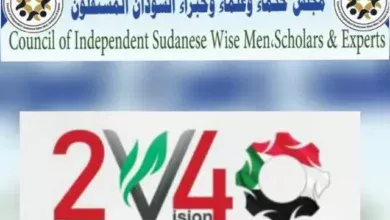The phone call between Al-Burhan and Zayed…. Yesterday's enemy is today's friend ✍️ Muhammad Othman Al-Radi

Political science does not know the impossible, it is the art of the possible, and it is quite normal that yesterday's enemy simply becomes today's friend overnight. Politics does not know emotions, it is governed only by common interests.
Political circles, both internal and external, were surprised by the sudden phone call made yesterday by the President of the Sovereignty Council, Lieutenant General Abdel Fattah Al-Burhan, to the President of the United Arab Emirates.
Communication was expected at any time between Abu Dhabi and Khartoum for several reasons, including the intense international pressure exerted on Abu Dhabi by the international community to reverse its position on supporting the Rapid Support Forces.
The military and diplomatic victories, as well as the local and regional international attention that the Sudanese issue has received in recent years, have confused the calculations of Abu Dhabi and those behind the issue.
The aim of this move is part of the efforts of the United States of America to block the path to a Russian-Sudanese rapprochement, while coinciding with the expected visits between Khartoum and Moscow, at the top of which is the visit of the Sudanese and Russian presidents in the coming days.
Ethiopian Prime Minister Abiy Ahmed's visit to Sudan was not a coincidence or a mere coincidence, but rather an organized and thoughtful visit that carried many messages in everyone's mail, both internally and externally.
The Ethiopian Prime Minister is the spoiled son of the United States of America, one of its effective mechanisms on the African continent, and its clear spokesperson and one of its effective agents. He is considered a man with difficult missions, the best proof of this. It is the sudden rapprochement between Abu Dhabi and Khartoum.
Washington has certainly not and will not stand idly by as Sudan packs its bags and leaves the Western bloc under its leadership to head for the Eastern bloc led by Russia.
It would break his back if Al-Burhan reversed his decision, took a sharp position and abandoned the rapprochement between Khartoum and Moscow. This would lead to violent negative reactions, and Sudan would pay a very expensive bill now and in the future, and it would lose its most important strategic ally.
Unfortunately, successive Sudanese governments have been creative and ingenious in various ways to squander irreplaceable opportunities to make the most of such situations for a very simple reason, which is the fossilized mentality of this leadership addicted to thinking on its feet.
The United States of America does not have a clear vision on the Sudanese issue and is subject to the desires of some agenda-setters who already have hostile positions towards Sudan, and it certainly constitutes a stumbling block on the path of Sudanese-American relations. rapprochement.
There is an almost complete consensus among the Sudanese people who support the Sudanese army. They consider the importance of the Sudanese-Russian rapprochement at this stage as an absolute necessity and have thus formed a strong and effective internal public opinion. to put pressure on the President of the Sovereignty Council to accelerate this rapprochement, and any withdrawal from this matter will be understood as a political apostasy that is difficult to repent of.





